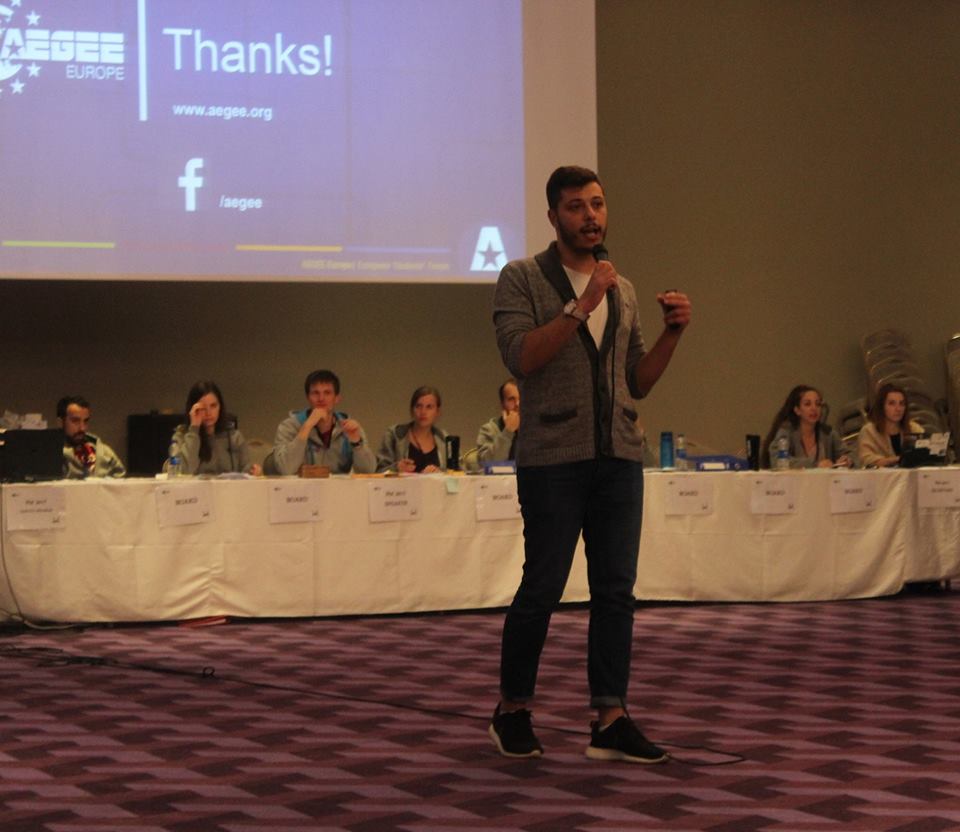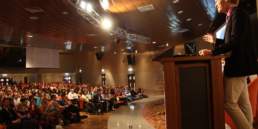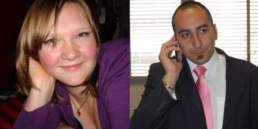Among all the elections, the delegates of Spring Agora Kraków have the delicate task to elect the next leader of our organisation. One of the two candidates is Spyros Papadatos, current speaker of the Network Commission. The 23-year old member of AEGEE-Ioannina made the members the core of his program, wanting to implement the Strategy for Learning and Training of AEGEE, which is up for approval in Kraków. “Sometimes we just need to think outside the box and offer something new”, is one of Spyros’ mottos. Get to know him better by reading the interview below!
Erika Bettin: Can you please introduce yourself, your life in and out AEGEE, your passions?
Spyros Papadatos: I’m Spyros, 23 years old AEGEEan and I define myself as an active citizen and a traveler. I love beautiful landscapes, long walks listening to music and discussions with inspiring people. Also as a history-lover I cannot resist to reading old reports and Agora minutes. (Spyros laughs)
What is your vision for AEGEE?
I envision AEGEE as a safe place for discussion, offering opportunities to young people to learn, explore and develop. The idea for a borderless Europe still remains our core value after 33 years; yet there is still a long road to go to achieve it. However, throughout the years AEGEE has proved that it is capable to initiate the change both to the local and the international level by bringing young people closer and giving them space to realize their ideas and their initiatives. United we stand stronger and that’s what Europe needs today.
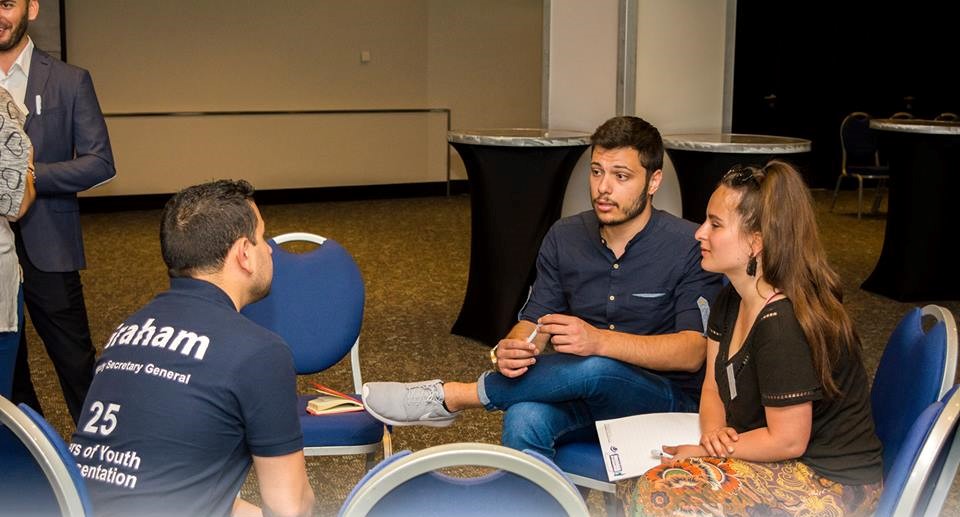
Seven people who sometimes do not know each other or never worked together, living and working in the same environment. Seven different ideas on how things should be in AEGEE and new ideas on how to change it. The task of a President is to lead the pack and to dictate the direction of the board of directors. What is your primary concern in leading the team? What is your leading style?
For one whole year, seven different people work and live together in the same house. As some of us can imagine this can be very tricky, having to coordinate both the administrative and creative work of the European board of AEGEE. And in order to work and live in a healthy environment, you have to manage the stress, the pressure, the hundreds of deadlines, all the overwhelming feelings this demanding atmosphere can create. However, as in every local or project or body of AEGEE, a person doesn’t have to handle this situation alone. They are part of a team, a team of seven people who are in this together, having each other’s back, supporting and motivating every part of the team. And this is also the role of the president; to understand the team dynamics, to make sure to forge a common vision, to support their team members, to make sure the team functions and feels a team. Certainly this is not easy; you need experience in team management, having served both as a regular team member, not only a team leader. You need experience in conflict and crisis management, a positive and supportive character, as well as a vision and passion to keep everyone motivated. Of course no one is perfect, however I feel ready and competent to take that step and I will try my best to follow this vision if I get elected. Moreover, I have already worked more or less with all the other CD candidates, some of them I am even lucky to call friends. Therefore, I believe it will make the job and the team bonding process easier and smoother.
Connected to the previous one, several candidates are coming from the Network Commission. How would you make sure that the same patterns of the last CD term won’t repeat during this year in CD? And how would you make sure that those who are not from Netcom are not left out?
After being part of NetCom for two years and having worked closely with three CDs, I can say that it is always valuable to have experience working with locals from different parts of the Network and having a good understanding of the situation of the Network, independently if you are Network Director or External Relations Director or Secretary General. No matter which position or portofolio you hold, if you have experience with working straight with different locals, you can serve better the Network as a whole. Out of the ten CD candidates, four have been members of the Network Commission. To be honest, I find it a good balance and here’s why. On one hand, the next CD could possibly have several people who have worked already directly with locals; but it can have also at least the other half of the team coming from different backgrounds, bringing different perspectives, that we as NetCommies might not see so easily – we are sometimes falling in the trap to think inside the “NetCom bubble”. That is why it is crucial to have this variety and I believe that the Agora will have the chance to come up with a good and balanced combination for the next CD.
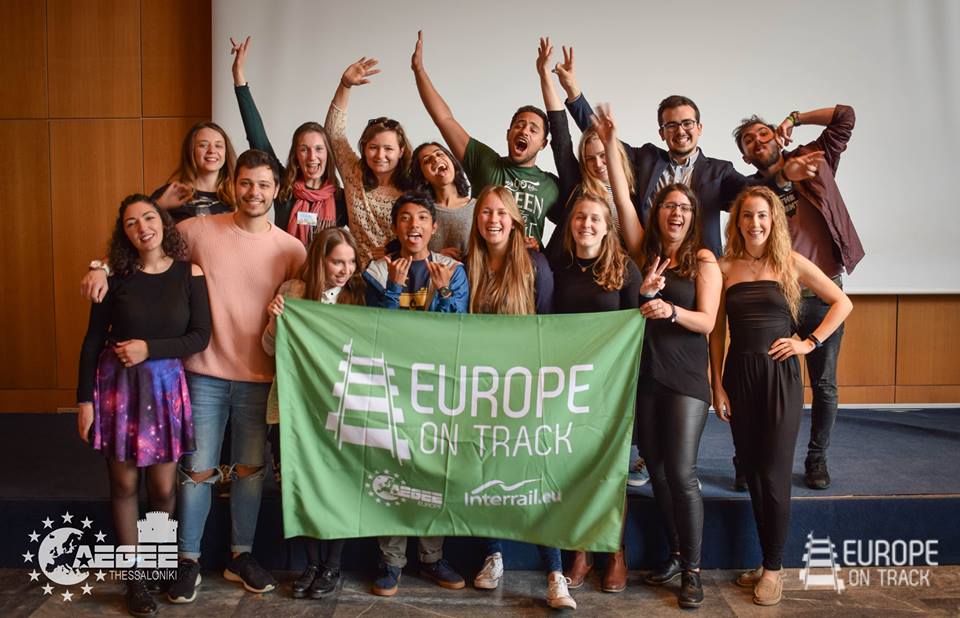
One of the biggest part of the President’s portfolio is to deal with External Relations, both in the EU bubble and with other NGOs, often cooperating with them to advocate together. What do you think should be higher in the advocacy process of our association and with which NGOs and European institutions would you pair up to reach the result of a successful advocacy campaign?
There are several hot topics on the European table right now that AEGEE can work on and contribute to; the Erasmus+ update “Erasmus x 10”, the new EU Youth strategy starting from 2019, the European Solidarity Corps, the European Parliament elections of 2019 and youth participation. These are all topics that several European stakeholders are working on, like the European Youth Forum or European Movement International or fellow youth NGOs. In addition to this, the local and regional level enhancement is something that the Council of Europe supports and promotes a lot, while it aligns with the core values of our association – plus the point regarding the network of empowered cities of our Strategic Plan.
You mentioned that a consistent PR is not only being “Visual Identity freaks”, but we need to go to the roots of the problem. In your opinion what is it? and what are your concrete plans to solve it?
The root of the problem in my opinion is connected to how we market ourselves to potential new members, but also to local stakeholders and not only – basically local external relations. I mentioned already in my candidature the example of recruiting members through the SU project and promoting the project as an opportunity of cheap summer holidays, a practice that has been proven dangerous for our recruitment.
Another example of how we sell ourselves is at our local communities. Usually local stakeholders like the university or the municipality treat the locals like just a group of people who is only asking – for financial support, office, venues and more. However, if we start promoting the locals or AEGEE-Europe as reliable partners, building collaborations and eventually partnerships with them, depending on the individual circumstances of each case, we can improve our visibility in the local communities and thus the AEGEE presence in them. PRC can be of great help in this case, providing the locals with personalized advice and materials, as well as creating a consistent PR strategy for AEGEE-Europe. Last but not least, the current Interim Communications Director has been improving a lot the visibility of the AEGEE opportunities both internally and externally with a professional and frequent newsletter and a more coherent approach in the social media – applause for this! These are practices that it would be great to continue and build further on them.
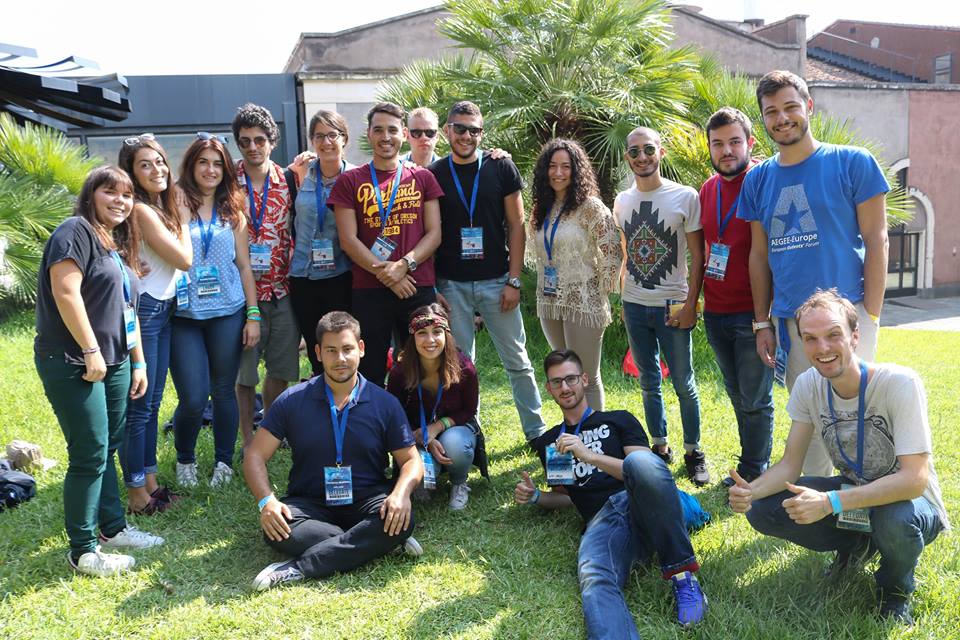
In the past few months we have seen that many conferences were indeed organised, but along with them came the Extended Open Call, a critical sign that participants were needed. What is, according to you, the reason for this perpetual need of Open Calls? And how would you tackle the problem?
I think when it comes to promoting the conferences and in general the events that are being organized, one critical point are the ways we promote them and what we offer. Sharing the same post in every AEGEE Facebook group every two or three days is not that effective and it doesn’t bring something new to the table. But how can we face this? I will mention another example. When we were preparing the opening conference of Europe On Track this year, we knew that Smart Cities was a very specific and focused topic which could seem very technical and not the most attractive one for the regular AEGEE members. However, we tried to bring something new to the table; we included a one-day climathon in the program, a problem-solving concept where the participants could implement what they learned in the first days of the conference and work on a more practical approach of the topic of the conference. Additionally, we made sure it had visibility equally inside and outside of AEGEE, made a short video and promoted it with the help of other relevant NGOs and stakeholders. And yes, we needed an extended open call as well, but in the end managed to gather 100 people, both local and international participants, who could use the knowledge they acquired during the conference back in their local communities. Sometimes we just need to think outside the box and offer something new to participants. Even if you cannot find the 30 or 50 or 70 participants for your conference among the already existing members of AEGEE, just go beyond that – and at the same time make new AEGEE members!
In case you are elected, your CD will start from where CD55 will finish. Name one thing you would like to keep working on from their work and one thing that you would implement differently. And why?
I think CD55 – together with the relevant officers – has been doing a great job working on updating and creating new partnerships for AEGEE, which was quite impressive. I would prioritize that CD56 continues their work, combined of course with working on the secretariat strategy. We saw many new people in the headoffice this year as officers, which was incredible. What I would try to improve would be the visibility and transparency of the CD work, as for example we haven’t seen CD decisions shared with the Network for quite some long time now. Also, I think it’s important to put more efforts in restarting The AEGEEan; we for sure miss our dear magazine in the last months, as it is important to have an active journalism body in our association.
The members are mentioned several time in your candidature and you want to create a proper HR strategy in collaboration with the HRC. Do you have already in mind a possible draft of this strategy? If yes, which one?
Maybe it was not quite visible in the Network, but for the last months, the Internal Education taskforce – composed by the Academy, Human Resources Committee, Youth Development WG, Network Commission and Comite Directeur – has been working on updating the Strategy for Learning and Training of AEGEE. As part of this strategy, the HR cycle and members path have been updated based on the current situation of the Network. I think these parts can be a good basis for the HR strategy I mentioned – plus HRC drafted an HR needs of the Network report just before Agora Enschede. Therefore, I think we have the data and the competent people to work on this project, we just need to push it and support the process.
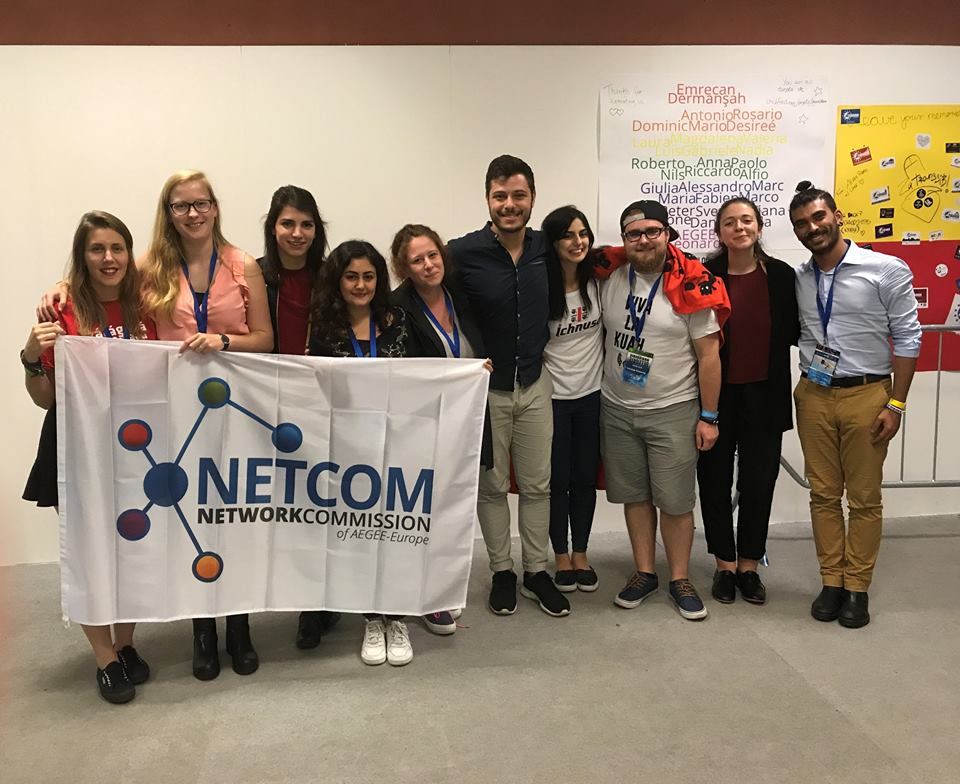
Since the lack of implementation is one of the biggest problems in our association, think for a moment that you are in the Comité Directeur and all your ideas are featured in the CD56 activity plan. Pick a project you would like to implement among those listed in your program and create a feasible timeline for it explaining how you would like to do it.
Since I have been part of the Internal Education taskforce for almost two years now, I would prioritize the possible implementation of the updated Strategy for Learning and Training of AEGEE, if Agora Krakow ratifies it. More specifically:
– Working on the preparation phase: drafting the tools, materials and the new format of Internal Education events – such as LTCs and RTCs – in collaboration with the relevant bodies by September 2018.
– Presenting the practical implementation and new format of those events at Autumn Agora Istanbul 2018.
– Have a trial period in autumn 2018 to test out how the new Internal Education events work out for the various locals; give the chance to the Network to feedback how it’s working out, what can be improved by end of 2018.
– Implement the feedback of the locals, improve what didn’t work out during this trial period and make sure that everything functions well for spring 2019 and all the things pending are taken care of, so the strategy can be fully implemented by Spring Agora 2019.
Questions from the network
Question one: Many of the Greek speaking locals are not happy with your work as Netcommie considering your other obligations. How you can assure us that you will be able to handle the much bigger Presidential portfolio?
Dear fellow anonymous member, I can publicly state that during the two years that I have been a NetCommie I have never received an unofficial or official complaint due to inactivity by any of my locals. On the contrary, I have always heard really good feedback, even asked to run for a second and third term. Feel free to contact me so I can redirect you to presidents or board members of my locals. In any case, if you are indeed not happy with my work, you are welcome to contact me personally and give me your feedback and suggestions – you can’t improve if you don’t know what you’re not doing good enough.
Question two: Do you think you might have the chance to fail as a President of AEGEE-Europe without previous CD experience?
Of course, CD can be as any job in the world; there is a chance that one doesn’t like it or can’t handle the pressure and the workload or whatever might come up. Especially when you are candidating for president, the gravity is even more, as you have to not only remain motivated yourself, but keep your team motivated as well. After working in several fields in the local and European level of AEGEE, such as projects, network development and external relations, and working closely with different CDs for the last three years, I feel more ready than ever to serve as president and work with passion and discipline for the whole term.
Question three: What do you as a candidate for President of AEGEE-Europe think about the antenna criteria proposal proposed by the CD?
It is always good to question how we do things and try to improve. However, considering that an anntenae criteria reform was ratified last year at Agora Enschede, I think it’s too soon to go for another drastic change, as you need to give some time to the Network to see how the latest reform worked out and to make sure it’s fully implemented before introducing a new one. So considering that there are still some unclear spots in the last reform and work to still be done regarding its implementations, I think the new drastic proposal feels a little bit quick and needs further consultations. However, the decision rests in the hands of the Agora and any outcome will be treated accordingly with respect.
Question four: Based what happened within CD55, how would you prevent resignations within the team?
First of all, it is still unclear what happened with CD55. The only people that know what happened are the ones who experienced it, thus it is tricky for us to fully understand it as we know only two different versions of it. Yet, as it has been said before, CD is for sure a challenge and can push people to their limits and every case is completely different. The best way to deal with it is being proactive, ensuring a healthy working environment and positive climate in the team and supporting each and every team member.
Written by Erika Bettin, AEGEE-Verona
You can read Spyros’s full candidature here.
Check also the interviews with the other CD candidates:
- Monika Mojak for Secretary General
- Luca Bisigini for Financial Director
- Oguzhan Ayhan for Financial Director
- Alejandra Piot for Comité Directeur
- Evrim Emiroğlu for Comité Directeur
- Elena Efremova for Comité Directeur
- Müge Güner for Comité Directeur
- Marco Daniele for Comité Directeur
Related Posts
1st August 2019
The Gallery of All Presidents of AEGEE-Europe
Here is the gallery of all Presidents of AEGEE-Europe - with photos of every one of them. Enjoy the list!

